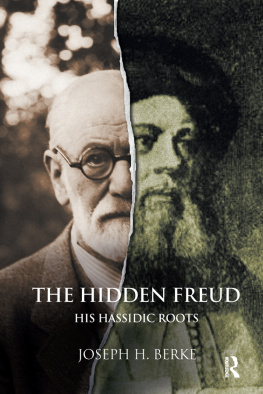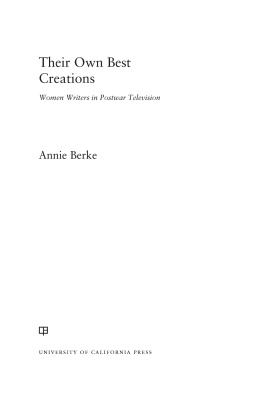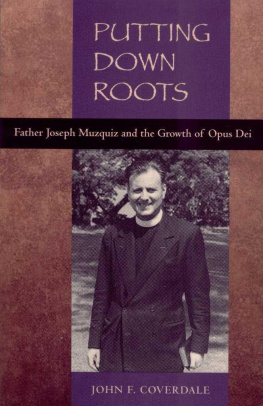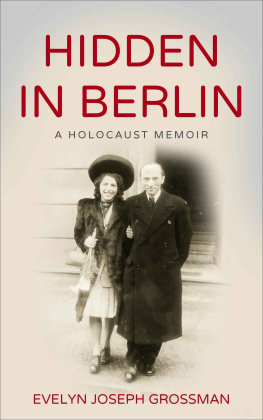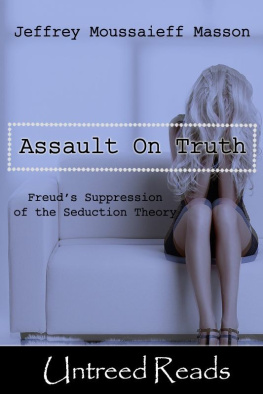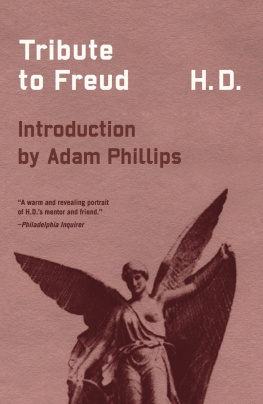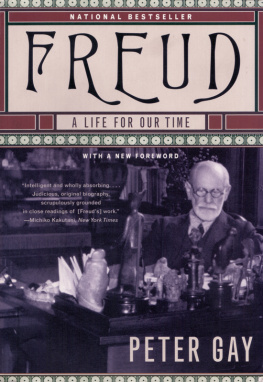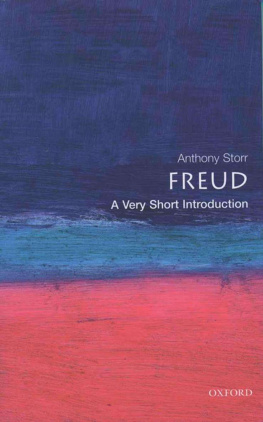Joseph H. Berke - The Hidden Freud: His Hassidic Roots
Here you can read online Joseph H. Berke - The Hidden Freud: His Hassidic Roots full text of the book (entire story) in english for free. Download pdf and epub, get meaning, cover and reviews about this ebook. year: 2018, publisher: Routledge, genre: Home and family. Description of the work, (preface) as well as reviews are available. Best literature library LitArk.com created for fans of good reading and offers a wide selection of genres:
Romance novel
Science fiction
Adventure
Detective
Science
History
Home and family
Prose
Art
Politics
Computer
Non-fiction
Religion
Business
Children
Humor
Choose a favorite category and find really read worthwhile books. Enjoy immersion in the world of imagination, feel the emotions of the characters or learn something new for yourself, make an fascinating discovery.
- Book:The Hidden Freud: His Hassidic Roots
- Author:
- Publisher:Routledge
- Genre:
- Year:2018
- Rating:5 / 5
- Favourites:Add to favourites
- Your mark:
- 100
- 1
- 2
- 3
- 4
- 5
The Hidden Freud: His Hassidic Roots: summary, description and annotation
We offer to read an annotation, description, summary or preface (depends on what the author of the book "The Hidden Freud: His Hassidic Roots" wrote himself). If you haven't found the necessary information about the book — write in the comments, we will try to find it.
The Hidden Freud: His Hassidic Roots — read online for free the complete book (whole text) full work
Below is the text of the book, divided by pages. System saving the place of the last page read, allows you to conveniently read the book "The Hidden Freud: His Hassidic Roots" online for free, without having to search again every time where you left off. Put a bookmark, and you can go to the page where you finished reading at any time.
Font size:
Interval:
Bookmark:

His Hassidic Roots
Joseph H. Berke

First published 2015 by
Karnac Books Ltd.
Published 2018 by Routledge
2 Park Square, Milton Park, Abingdon, Oxon OX14 4RN
711 Third Avenue, New York, NY 10017, USA
Routledge is an imprint of the Taylor & Francis Group, an informa business
Copyright 2015 Joseph H. Berke
The right of Joseph H. Berke to be identified as the author of this work has been asserted in accordance with 77 and 78 of the Copyright Design and Patents Act 1988
All rights reserved. No part of this book may be reprinted or reproduced or utilised in any form or by any electronic, mechanical, or other means, now known or hereafter invented, including photocopying and recording, or in any information storage or retrieval system, without permission in writing from the publishers.
Notice:
Product or corporate names may be trademarks or registered trademarks, and are used only for identification and explanation without intent to infringe.
British Library Cataloguing in Publication Data
A C.I.P. for this book is available from the British Library
ISBN-13: 9781780490311 (pbk)
Typeset by V Publishing Solutions Pvt Ltd., Chennai, India
CHAPTER ONE
Sigmund Freud and the Rebbe Rashab
CHAPTER TWO
A tale of two orphans
CHAPTER THREE
The Jewish mystical traditions
CHAPTER FOUR
Bion and Kabbalah
CHAPTER FIVE
On the nature of the self: and its relationship with the soul
CHAPTER SIX
On the nature of the soul: and its relationship with the self
CHAPTER SEVEN
The replacement child
CHAPTER EIGHT
Sigmund Freud and Rabbi Safran
CHAPTER NINE
On opposites
CHAPTER TEN
Lowness of spirit
CHAPTER ELEVEN
Reparation
CHAPTER TWELVE
Atonement
I am very grateful for all the help I have received in the writing of this book.
In particular I wish to acknowledge the contribution of my friend and colleague, Prof. Stanley Schneider, of the Hebrew University. Much of the work I present is based on the papers and book which we have jointly researched and written.
I also wish to give special thanks to my wife, Shree, for her patient support, wise comments, and helpful editing.
Many friends and colleagues have enabled this work to come to fruition. Thank you so much for your contributions.
Rabbi Shimon Cowen
Dr. Sanford Drob
Dr. Michael Eigen
Rabbi Mendel Gordon
Professor Robert Hinshelwood
Ms. Ilany Kogan
Rabbi Shmuel Lew
Professor Naftali Loewenthal
Professor Kate Loewenthal
Mr. Alistair Mann
Mr. David Morgan
Mr. Matthew Rosen-Marsh
Mr. Ephraim Rosenstein
Mr. Henry Rotstein
Dr. Morton Schatzman
Ms. Ann Shearer
Rabbi Yossi Simon
Swami Sadasivananda
Mr. Rod Tweedy
My appreciation to Oliver Rathbone, managing director of Karnac Books for commissioning this book and to his staff for preparing the manuscript, and especially to Kate Pearce and Cecily Blench, project managers, and James Darley, copy editor, who have all done so much in seeing the book through to publication.
My appreciation to Rabbi Nathan Lopes Cardozo for sharing with me the correspondence between Dr. Samuel Eisenstein and Rabbi Alexandre Safran, and for permission to reproduce it.
My appreciation to the Freud Museum for permission to reproduce in Hebrew Jacob Freuds message to his son Sigmund on the occasion of his thirty-fifth birthday.
My appreciation to the staff of the Royal Society of Medicine, London for assisting my research.
Joseph Berke is a psychoanalytic psychotherapist working with individuals and families. He is a lecturer, writer, and teacher and has lived in London since 1965. Beforehand he attended Columbia College of Columbia University and graduated from the Albert Einstein College of Medicine of Yeshiva University in New York.
Dr. Berke moved to London to study with Dr. R. D. Laing and assisted in establishing the Kingsley Hall Community. There he helped Mary Barnes, a middle-aged nurse who had been diagnosed with schizophrenia, to pass through a severe regression. Barnes later became a noted artist, writer, and mystic. The book which Barnes and Berke co-authored (Mary Barnes: Two Accounts of a Journey through Madness, 1972) was adapted as a stage play and has been performed in many countries. It has now been optioned as a feature film.
In 1970 Berke and colleagues founded the Arbours Housing Association in London in order to provide personal, psychotherapeutic care and shelter for people in emotional distress. Later he founded and was the director of the Arbours Crisis Centre.
Berke is the author of many papers and books on psychotherapy, social psychiatry, psychosis, therapeutic communities, and transpersonal psychology as well as Kabbalah and Hassidism. For further information, please visit his website: www.jhberke.co.uk
This book began in the 1980s after I was asked to give a talk about psychoanalysis and Kabbalah at the Leo Baeck College in London. The subject aroused my interest because I am a psychoanalytic psychotherapist and I had been attending seminars on Kabbalah, the Jewish mystical tradition. This led me to explore the relationship between the two disciplines in depth. My question was, Is there a connection between psychoanalysis and Kabbalah. The answer I found was, Yes, a very profound one. So much so, that I concluded that psychoanalysis is a secular extension of Kabbalah. Subsequently I wrote a paper on the subject entitled, Psychoanalysis and Kabbalah (1996, pp. 849863).
A few years later, while meeting with my friend, Rabbi Shmuel Lew, a Lubavitch emissary in London, he told me that the fifth Lubavitcher Rebbe, Rabbi Shalom Dov Ber Schneersohn, known as the Rashab, had been to see Sigmund Freud. My reaction was utter disbelief, for Freud was known for his antireligious views and I hardly thought that the leader of the Lubavitch movement would need to consult a therapist, especially a secular one. I told Rabbi Lew that I did not think this was likely. He replied that he had attended a farbrengen (hassidic gathering) at 770 (the name of the Lubavitch headquarters in Brooklyn) in May 1962 when the Rebbe (Menachem Mendel Schneerson) gave a long discourse. In it he referred to the diaries of his predecessor, Yosef Yitzhak Schneersohn (the sixth Rebbe, known as the Rayatz), who said his father (the Rashab) had consulted a famous professor in order to overcome lowness of spirit. The Rebbe revealed that the famous professor to whom the Rashab had turned to for help was Sigmund Freud.
I further discovered that a number of accounts had been published in Yiddish and Hebrew about the encounter between the Rashab (fifth Lubavitcher Rebbe) and Freud. Friends translated these for me. Reading them led to the publication of two papers. The first concerns the encounters between the Rashab and Freud in the period JanuaryApril 1903. The second has to do with the mysterious trip that the Rashab and his son made to Pressburg (now Bratislava in Slovakia) just before the Rashab met Freud.
I have included these papers in the initial chapters of this book. The rest of the book has to do with the relationship between Freud, his work, the Jewish transcendent tradition, and Hassidism. This is a mystical and religious renewal movement rooted in the Kabbalah, and applied to everyday life.
Font size:
Interval:
Bookmark:
Similar books «The Hidden Freud: His Hassidic Roots»
Look at similar books to The Hidden Freud: His Hassidic Roots. We have selected literature similar in name and meaning in the hope of providing readers with more options to find new, interesting, not yet read works.
Discussion, reviews of the book The Hidden Freud: His Hassidic Roots and just readers' own opinions. Leave your comments, write what you think about the work, its meaning or the main characters. Specify what exactly you liked and what you didn't like, and why you think so.

